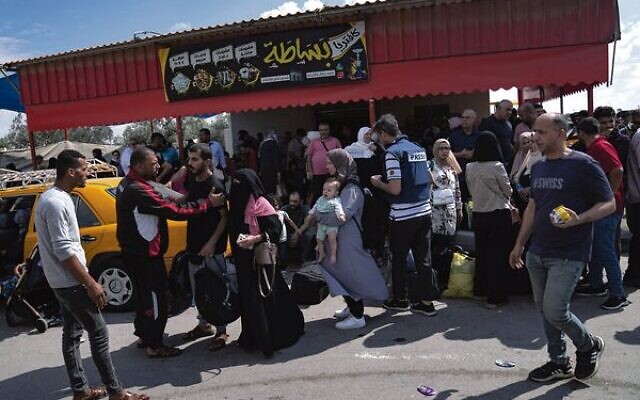‘Horrified’ by attack but critical of response
"Nothing excuses these acts by Hamas, but you cannot ignore what has been happening in Gaza for all of these years," the diplomat said.

(TIMES OF ISRAEL) – A PAIR of senior diplomats representing Arab countries that have ties with Israel have said that their governments were horrified by the scenes that came out of southern Israel after the shock Hamas onslaught on October 7, during which gunmen slaughtered more than 1400 people.
The comments were made on condition of anonymity, as the vast majority of the Arab world has refrained from condemning the Hamas assault, instead preferring to censure attacks on civilians in a general way.
Only the United Arab Emirates issued a specific condemnation of Hamas.
While the two diplomats insisted that there is wall-to-wall disapproval among Israel’s Arab allies and beyond of the atrocities committed by Hamas on October 7 – one of them saying his government was “horrified” – they said the attacks prove the failure of Israel’s long-maintained strategy of “ignoring the Palestinian issue”.
One of the diplomats pointed to Israeli Prime Minister Benjamin Netanyahu’s speech last month at the UN General Assembly, in which he asserted that peace between Israel and the Arab world can precede peace with the Palestinians.
“Nothing excuses these acts by Hamas, but you cannot ignore what has been happening in Gaza for all of these years,” the diplomat said.
Moreover, the two diplomats said, Israel’s crushing response in Gaza to the Hamas attacks has led to the dissipation of goodwill that Jerusalem had briefly obtained from some of its Arab allies.
The diplomats said their governments were particularly incensed by calls from some Israeli figures for Egypt to take in refugees from Gaza, explaining that this could set a precedent for the mass transfers of Palestinian populations from the West Bank into Jordan, which Amman strongly opposes.
“Egypt and Jordan view such proposals as existential threats,” said one of the diplomats.
Jordan’s King Abdullah II said last week that neither his country nor Egypt will accept Palestinian refugees, declaring it a “red line.”
“Some of the usual suspects are trying to create facts on the ground,” Abdullah said during a press conference held after meeting German Chancellor Olaf Scholz in Berlin.
“There will be no refugees in Jordan and no refugees in Egypt.”
Senior Hamas figure Khaled Mashaal said in an interview last week that Gazans will not leave the Strip no matter what, and that their displacement would harm Egyptian national security and would pose a danger to Jordan.
The diplomats explained that while some in Israel interpreted the Abraham Accords to mean that Arab countries that normalise with Jerusalem no longer care about the Palestinian cause, the latest Gaza war should serve as a reminder that sympathies and allegiances in the region remain with the Palestinians.
“The Abraham Accords were never going to immunise Netanyahu from the Palestinian issue,” said Hussein Ibish, a senior scholar at the Arab Gulf States Institute in Washington.
“What they did was make Israel’s relations with some of its Arab neighbours more normal,” he added, arguing that a subsequent decision to temporarily suspend those ties would also be part of that “more normal relationship”.
Ibish argued that following the October 7 onslaught, Israel’s Arab allies would prefer that the IDF carry out a limited military campaign in Gaza that weakens Hamas considerably.
He maintained that destroying the terror group completely would be a “pipe dream” and that they will not support the kind of gruelling military operation that appears to be in the works.

comments